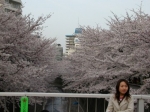23 May 2006
What is "The Crysanthemum and the sword?"
| A Classic Analysis of the Japanese People - The Crysanthemum and the Sword | |
| | |
| The Crysanthemum and the Sword is a comparative analysis written by cultural anthropologist Ruth Benedict during the Second World War. |
21:25 Posted in Books, Culture | Permalink | Comments (0) | Tags: Japanese
02 April 2006
Cherry Blossoms (What we call "Sakura")
This is the season I can think the scenaries of our country are better than any other country in the world.
Streets and parks in the city are decorated with pinky-white cherry blossom trees. Please see the photo album. I have more pictures of cherry blossoms in the city.

22:20 Posted in Tokyo Life | Permalink | Comments (0) | Tags: Japanese
11 November 2005
Controversy over Article 9 amendment
More than half of Japanese citizens disagree with amendment of article 9 of the constitution, which prohibites State's possesion of arms. Even among youngsters who never exprienced or know the stories about the war there exists strong opposition.
Even after 60 years, people's opinion about the Pacifist constitution is not greatly changed. No one wants the war. But some politicians want to change it.
Well, my opinion is since I am realist I agree with constitutional amendment. But not now, in the future. One of the reason many people oppose the amendment is they fear that if the constitution is amended, our troops would be easily sent to anywhere by stupid politics. Recently Japan sent troops to Iraq to follow the order of Bush. Our country lacks civilian control functions in the politics. That means our country's democracy is not functioning well.
We have yet to review the mistakes we made in the past. Older generations never reflected how they were wrong in the past. We've been suffering the traumas of the past and have yet overcome it. One example is denying of Masscre of Nanking. We always regret the consequences of the war, not the cause of the war we provoked. We rarely talk about Manchuria and Pearl Harbor.
We have to study the cause of the past mistakes.
That is what we have to do to get ready for the amendment.
Some oppose it simply because they are passionate pacifist. They say they want to make their country completely non military state like CostaRica. But that is totally impossible taking current situation Japan is in into account.
We have the troops so called "Self-Defense Force" and foreign mercenaries mainly stationed in Okinawa island already. That means we need military force to protect our national interests. Also it is not good for our country to heavily rely on US military presence. US is our most reliable ally but the foreign troops who always prioritize their own national interest ahead of others after all.
01:12 Posted in Politics | Permalink | Comments (1) | Tags: Japanese





